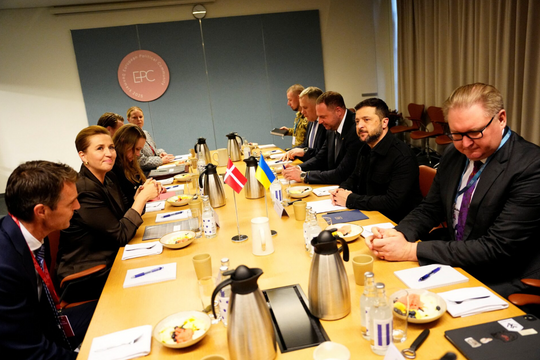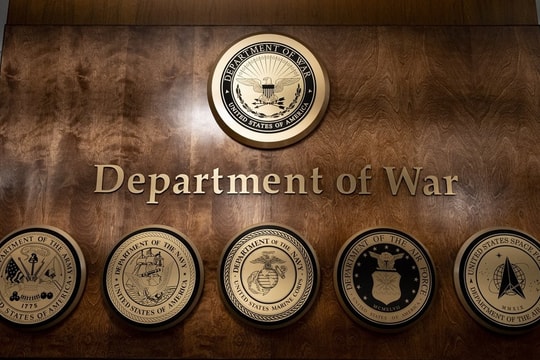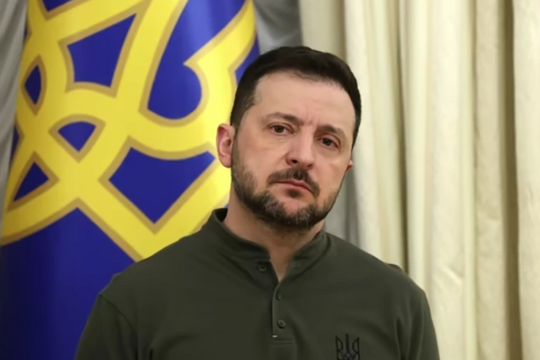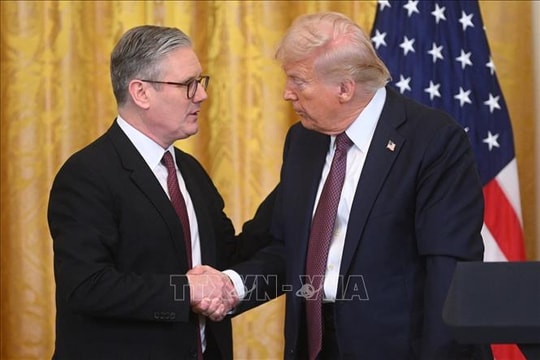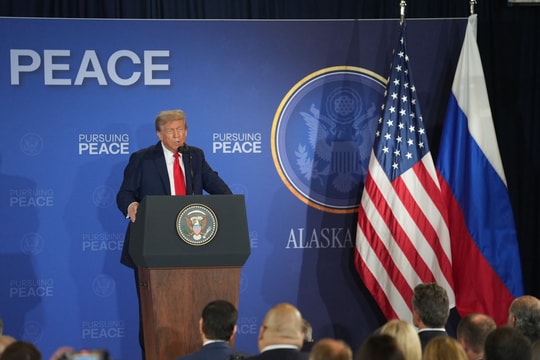US-Russia Summit: No re-establishment of bilateral relations
(Baonghean.vn) - International experts and politicians predict that the summit between the two most powerful leaders in the world will hardly achieve any progress, and there will not even be any "reset" in the US-Russia bilateral relationship.
Russian news agency Ria Novosti interviewed a number of foreign experts about their expectations surrounding the summit in Helsinki (Finland).
Previously, Mr. Trump and Putin met informally on the sidelines of the G-20 Summit in Hamburg (Germany) in July 2017 and the Asia-Pacific Economic Cooperation Summit in Da Nang (Vietnam) in November 2017.
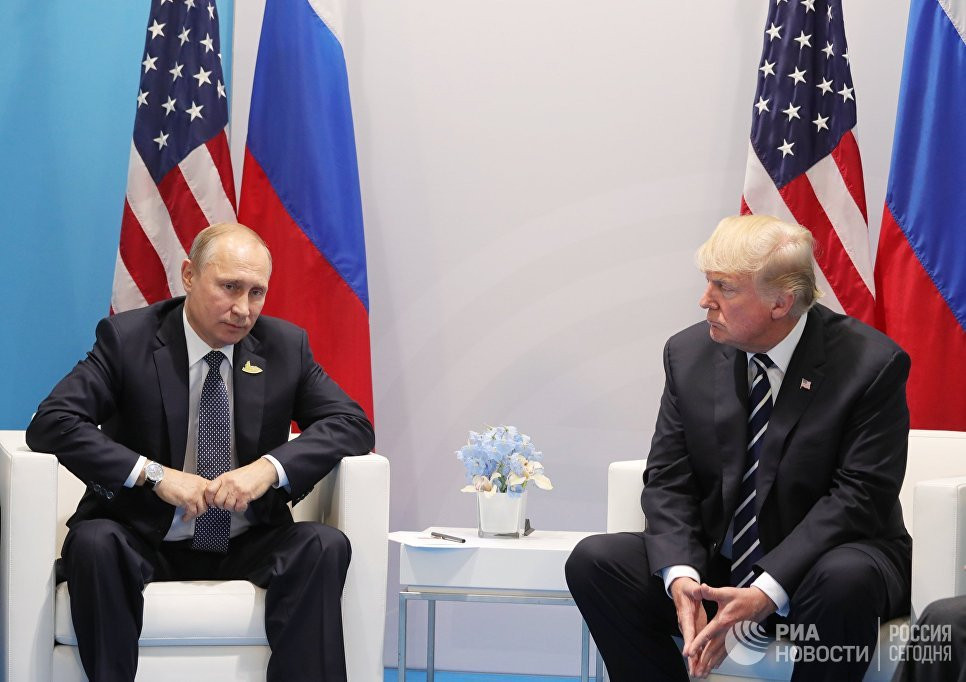 |
| Russian President Vladimir Putin and US President Donald Trump. Photo: Ria Novosti |
The symbolic meeting
Richard Sakwa – Professor of Russian and European politics at Kent University said that, with the original purpose, for the White House, the meeting was an opportunity to reduce diplomatic tensions, restore relations and solve many international issues.
"Any major concessions are unlikely, there may be small concessions, but this does not contribute to a radical solution to all problems. To change the relationship, it is necessary to change the agenda with really complex and difficult-to-solve issues. Therefore, the meeting is just a normal official business, without any relationship rebuilding" - Professor Sakwa commented.
The Syrian issue will be discussed and resolved first, or a strategic security agreement will be made. However, in such a short meeting, it is difficult for both leaders to come up with a final solution.
The political professor also said that the obstacles that hindered the preparation for the US-Russia summit were much more interesting than its results. Specifically, before the meeting, the US Department of Justice announced the indictment of 12 Russian military intelligence officers on charges of interfering in the 2016 US election. This new development has become a "useful tool to increase pressure and control actions" against President Trump.
Be careful with President Trump's moves
Former Iranian Foreign Minister Seyed Kamal Kharrazi frankly said that with his enthusiasm, President Trump often creates an open atmosphere with glossy statements. "We need to be careful and sober to make an accurate assessment," Mr. Kharrazi said.
The former Iranian foreign minister said that President Donald Trump will likely continue to develop a personal relationship with Mr. Putin, as many advisers and officials in the US government remain tough on Russia. Mr. Trump will continue to try to burnish his reputation as an effective negotiator, as he demonstrated in his meeting with North Korean leader Kim Jong-un.
Mr. Kharrazi commented that maintaining dialogue between the powers is a positive signal, but the meeting between Mr. Trump and Mr. Putin will hardly reach any special agreement.
To change the nature of the relationship, both countries will have to change, not only US policy but also Russia’s policy. The ambition of both sides is to become a great power with influence on a global scale, in all regions of the world. To find common ground, both Russia and the US need to focus on international issues, on worrying hot spots, and coordinate joint efforts to overcome challenges. If both sides maintain a rigid stance, nothing will change.There are no rose-colored glasses.
Dean of the Department of International Relations and Public Policy at the American University in Cairo (Egypt) and former Egyptian Foreign Minister Nabil Fahmi does not have much faith in the US-Russia summit.
Speaking about his expectations, Mr. Fahmi said that he is a supporter of the dialogue method, but needs to soberly recognize that the meeting takes place in the context of the two countries being surrounded by a series of crises and conflicts, the current disputes have seriously damaged the bilateral relationship between the US and Russia. "This does not create conditions for progress."
According to Mr. Fahmi, both Russia and the US are trying to ensure that the situation will not get worse, and both leaders want to be seen as politically victorious.
“I don't care who is the most talented leader in the world, but what matters most is how this world improves and changes” – said the former Egyptian Foreign Minister.
Sharing the same view, Indian Foreign Secretary Shiam Saran commented that there is no need to focus too much on this meeting, but rather "take a moment to evaluate and see whether there will be any results, especially a change in the political relationship".
“I do not expect much from the Helsinki summit. It will not bring any new developments in international politics, or the formation of a multipolar world” - Indian Foreign Secretary Shiam Saran
Mr. Saran predicted that the purpose of the meeting would be limited to clarifying the domestic policies of the United States itself rather than bilateral relations with Russia.
The most urgent concern in US foreign policy is to avoid misunderstandings with Russia because any misunderstanding about the purpose and content of policies or resolutions will risk creating a major mistake, causing a rapid escalation of tensions between the two powers.
Mr. Saran added that before his trip to Helsinki, President Trump criticized German Chancellor Angela Merkel for signing a major contract to buy Russian gas from the “Nord Stream 2” project, and bluntly said that Germany was being controlled and “imprisoned” by Russia. This also became a “bad” factor that hindered the meeting between Mr. Trump and Mr. Putin.
The summit between the US President and the Russian President will take place at 1:00 p.m. (Moscow time) - about 5:00 p.m. (Vietnam time) at the presidential palace - Presidentinlinna, Helsinki, Finland.
The conference will begin with a private meeting between President Trump and Putin, with only two interpreters present. After that, the Russia-US summit will begin.
After the talks, the two Russian and US leaders are expected to hold a press conference, including public statements and answers to four questions, two from each side.
Kremlin spokesman Dmitry Peskov said a joint statement was not mandatory after the meeting and statements would depend on the results of the conference.

